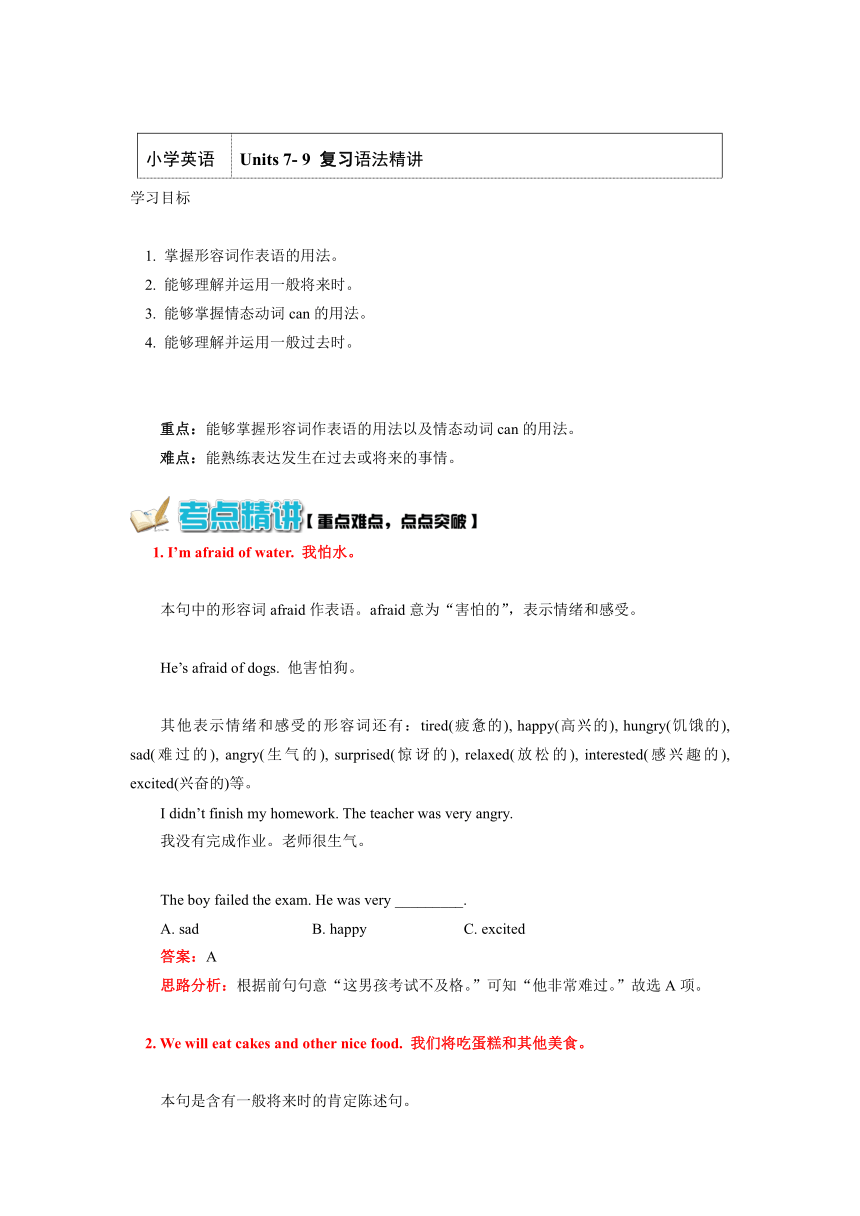
小学英语 Units 7- 9 复习语法精讲 学习目标 1. 掌握形容词作表语的用法。 2. 能够理解并运用一般将来时。 3. 能够掌握情态动词can的用法。 4. 能够理解并运用一般过去时。 重点:能够掌握形容词作表语的用法以及情态动词can的用法。 难点:能熟练表达发生在过去或将来的事情。 1. I’m afraid of water. 我怕水。 本句中的形容词afraid作表语。afraid意为“害怕的”,表示情绪和感受。 He’s afraid of dogs. 他害怕狗。 其他表示情绪和感受的形容词还有:tired(疲惫的), happy(高兴的), hungry(饥饿的), sad(难过的), angry(生气的), surprised(惊讶的), relaxed(放松的), interested(感兴趣的), excited(兴奋的)等。 I didn’t finish my homework. The teacher was very angry. 我没有完成作业。老师很生气。 The boy failed the exam. He was very _____. A. sad B. happy C. excited 答案:A 思路分析:根据前句句意“这男孩考试不及格。”可知“他非常难过。”故选A项。 2. We will eat cakes and other nice food. 我们将吃蛋糕和其他美食。 本句是含有一般将来时的肯定陈述句。 一般将来时由“助动词will +动词原形”构成。助动词will没有人称和数的变化。常与将来的时间状语连用,如:tomorrow, tomorrow afternoon, next year, in two days, in 2050等。 She will watch a movie this evening. 今天晚上他将看一部电影。 (1) 否定式:在助动词will后接not,缩写为:won’t。 They won’t travel to Beijing. 他们将不去北京旅行。 (2) 一般疑问句:将助动词will提到句首,且首字母大写,句末加问号。 —Will they travel to Beijing 他们将去北京旅行吗? —Yes, they will. / No, they won’t. 是的。/不,他们不去。 (3) 特殊疑问句:开头用特殊疑问词,其后加一般疑问句。 When will you have the party 你将什么时候举行聚会? (4) be going to结构是一般将来时的一种形式,其否定句在be后加not,一般疑问句将be提到句首。特殊疑问句开头用特殊疑问词,其后加一般疑问句。 He isn’t going to visit his grandparents this afternoon. 今天下午他将不去拜访他的祖父母。 —Are you going to play games 你们打算玩游戏吗? —Yes, we are. / No, we aren’t. 是的。/不,我们不。 How are they going to do that 他们打算如何做那个? 1. —_____ the children sing English songs on the coming International Children’s Day —Yes, they _____. A. Do; do B. Did; did C. Will; will 答案:C 思路分析:根据其后的时间状语on the coming International Children’s Day可知时态用一般将来时,故选C项。 2. The boy _____ books in the library tomorrow afternoon. A. is going to read B. are going to read C. be going to read 答案:A 思路分析:根据其后的时间状语tomorrow afternoon可知时态用一般将来时;主语是第三人称单数,故谓语动词用单数形式,选A项。 3. Mary and I won’t _____ the zoo. A. visiting B. visits C. visit 答案:C 思路分析:won’t是will not的缩写形式,其后应接动词原形,故选C项。 4. —_____is he going to buy the book —In the bookshop. A. When B. Where C. What 答案:B 思路分析:根据答语“在书店里”可知表示地点,故选B项。 3. Tomorrow we can go to the theater. 明天我们可以去剧院。 句中含有情态动词can,意为“能够;可以”。其后接动词原形。 Lily can play the guitar for the party. 莉莉可以为聚会弹吉他。 (1) 其否定句在can后加not,缩写为:can’t。一般疑问句将can提到句首,且首字母大写,句末加问号。 Mary can’t speak French. 玛丽不会说 ... ...
~~ 您好,已阅读到文档的结尾了 ~~

